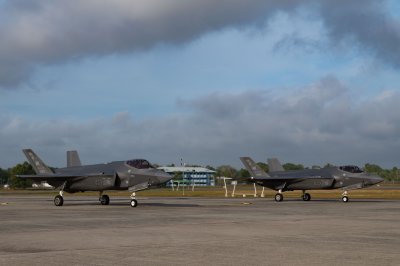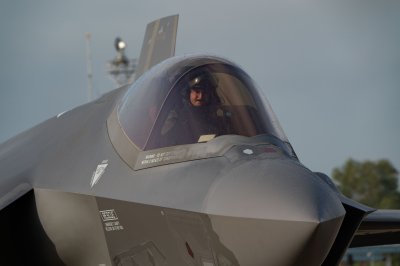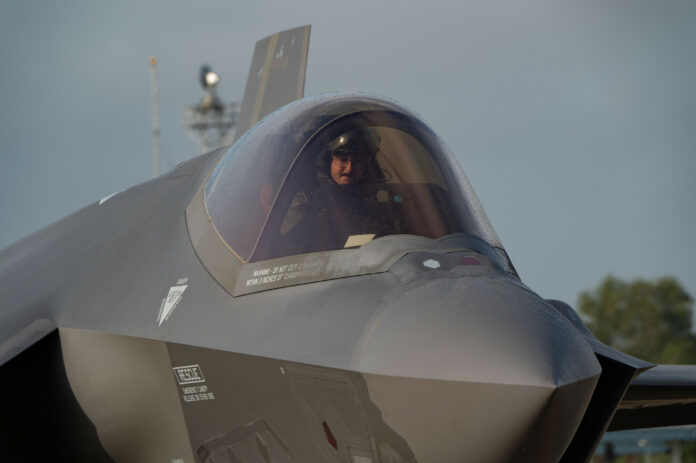American fifth-generation stealth fighters touched down in a new location in Southeast Asia this month, marking another milestone in the U.S.’ increased defense engagement with nations along the first island chain.
A pair of F-35 Lightning II jets, assigned to Eielson Air Force Base in Alaska, operated from Brunei’s Rimba air base on March 1-2 during a visit by a Pentagon official, the U.S. Embassy in Bandar Seri Begawan said this week.
“This was the first time a U.S. fighter aircraft landed in Brunei and represents a new model of international cooperation,” the U.S. Pacific Air Forces said of the history-making trip.
Tech. Sgt. Eric Summers Jr./U.S. Air Force
Brunei—Southeast Asia’s third-largest oil producer—is located on Borneo, an island shared with Malaysia to the north and Indonesia to the south, at the base of the first island chain, a series of islands that stretch from the Japanese archipelago in Northeast Asia through Taiwan, the Philippines, Borneo, and down to the Malay Peninsula.
The decades-old strategic concept is meant to serve as the first line of defense for the U.S. and its allies against Chinese military expansion into the Western Pacific, primarily by establishing choke points along key maritime routes leading to East Asia.
Newsweek‘s illustrated map, tilted on its axis and highlighting geopolitical allegiances, depicts the island chain from Beijing’s perspective and shows the proposed enclosure of China’s sea lines in wartime.
Brunei, a sultanate of 450,000 people, is situated at the southeastern edge of the resource-rich South China Sea—which is filled with vital shipping lanes to and from Asia—over which Beijing asserts sweeping territorial claims against half a dozen nations including the tiny oil kingdom.
Brunei’s 200-nautical mile exclusive economic zone overlaps with China’s claimed waters in the sea. It also controls territory in the contested Spratly Islands archipelago, but it maintains a cautious balancing act between the region’s larger powers.
“We consider Brunei Darussalam a key partner in the Indo-Pacific region, advancing our bilateral economic goals, peace, and security,” Capt. Gerald Peden, a spokesperson for the Pacific Air Forces, told Newsweek.
“The Indo-Pacific region is the priority theater. The United States is a Pacific nation; we are linked to Indo-Pacific neighbors through unbreakable bonds of shared history, culture, commerce, and values,” Peden said.
American and Bruneian forces regularly exercise together under a 1994 defense agreement. Their two governments are marking 40 years of formal diplomatic ties this year.
The F-35 stopover coincided with the visits of Jedidiah Royal, principal deputy assistant secretary of defense for Indo-Pacific security affairs, and Maj. Gen. Mark Weber, Air National Guard assistant to the commander of the Pacific Air Forces, according to the U.S. Embassy in Brunei.
A press release from Brunei’s air force said Royal was touring Southeast Asia to meet “key U.S. partners to advance mutual interests.” Brig. Gen. Dato Seri Pahlawan Mohd Sharif bin Dato Paduka Haji Ibrahim, Brunei’s air force commander, was given a tour of the F-35’s capabilities.
The Air Force visit to Brunei followed new milestones last year that included the first F-22 Raptor deployment to the Philippines and the first B-52 Stratofortress landing in Indonesia—both countries located on the South China Sea. American F-35 pilots also recently trained with F-15 and F-16 counterparts of the Singapore air force from March 4-7.
1 of 2

Tech. Sgt. Eric Summers Jr./U.S. Air Force

Tech. Sgt. Eric Summers Jr./U.S. Air Force

Tech. Sgt. Eric Summers Jr./U.S. Air Force
China is increasingly sensitive to U.S. military activities on its periphery, regarding them as a direct challenge to its interests and ambitions as Beijing’s hard power grows.
In his State of the Union address on Thursday, President Joe Biden said the U.S. was in a “stronger position” to outcompete China because he had “revitalized our partnerships and alliances in the Pacific,” listing India, Australia, Japan, South Korea and the Pacific Islands.
Beijing, which is Southeast Asia’s top trading partner, is intensifying its diplomatic efforts to dissuade nations within the first and second island chains from hosting U.S. military forces, arguing that such engagements should not undermine China’s security.
In a September report for the Congressional Research Service, Asian affairs analyst Caitlin Campbell said China was in the process of transforming the People’s Liberation Army into a modern fighting force grounded in high technology.
The Chinese military already has a formidable navy, air force and rocket force, as well as a growing nuclear arsenal.
“These advances notwithstanding, many of the capabilities the PLA is developing remain aspirational,” Campbell wrote, noting a Pentagon assessment that said China’s ability to operate beyond the first island chain remained “in its infancy.”
The Chinese Embassy in Brunei did not immediately respond to Newsweek’s written request for comment.
Uncommon Knowledge
Newsweek is committed to challenging conventional wisdom and finding connections in the search for common ground.
Newsweek is committed to challenging conventional wisdom and finding connections in the search for common ground.


